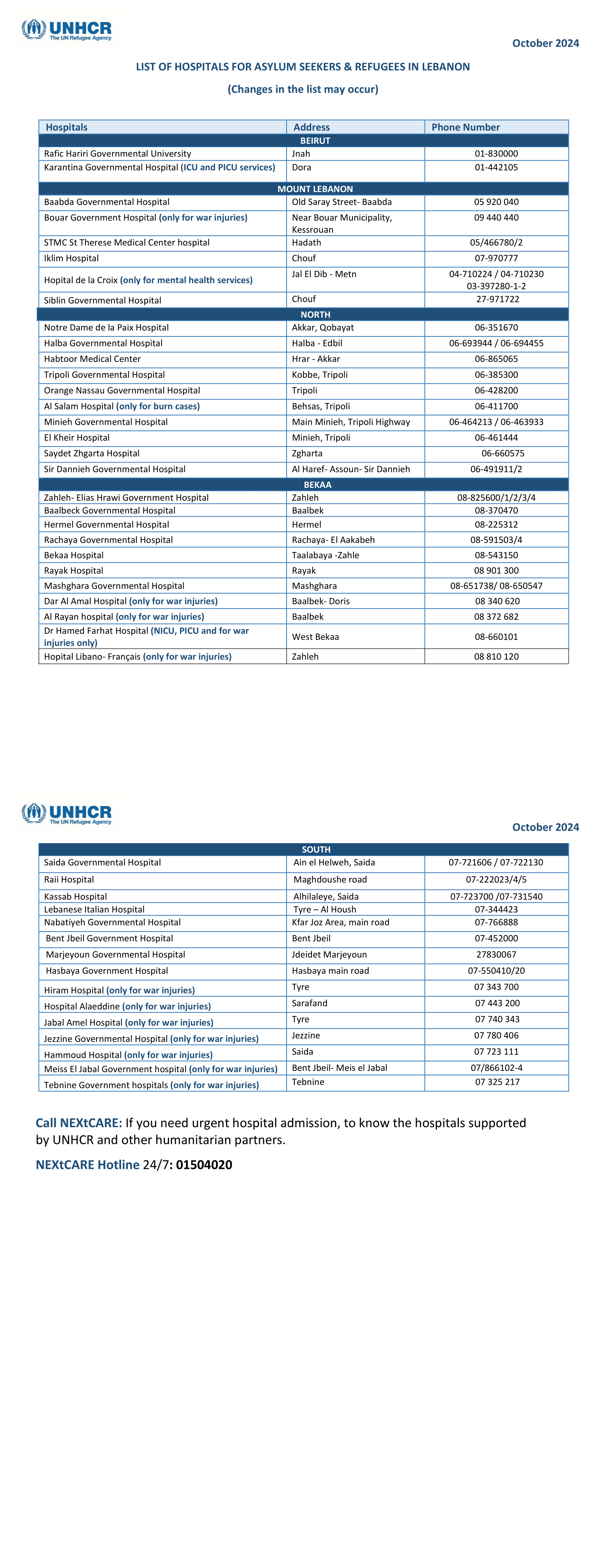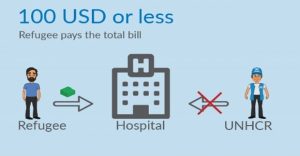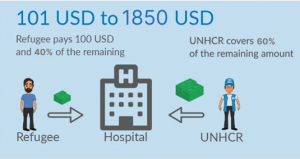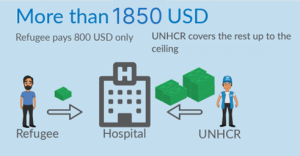UNHCR only provides support to persons known to UNHCR with an active file number or barcode. Starting 01 December 2025, UNHCR will no longer be able to cover hospitalization costs for refugees known to UNHCR in Lebanon. For more information, please see the following Q&As.
1. How can I access to hospital referral care?⬇️
If you are known to UNHCR and need to access hospital healthcare, you will first need to go to a doctor at a primary health care center. If a doctor at a primary health care center recommends your admission to a hospital for inpatient care, you should obtain approval from NEXtCARE. NEXtCARE facilitates admissions on behalf of UNHCR.
Please visit the page on Primary Healthcare to know how you can access primary healthcare.
2. At which hospitals can refugees receive hospital inpatient care?⬇️
To see the list of contracted hospitals, check the list below or call NEXtCARE at 📞01504020.
Starting 01 December 2025, UNHCR will no longer be able to cover hospitalization costs for refugees known to UNHCR in Lebanon.

3. I need to access emergency healthcare. What should I do?⬇️
If you are known to UNHCR and in need of emergency healthcare, please go to the nearest UNHCR contracted hospital and/or call NEXtCARE at 📞01504020 (available 24/7).
UNHCR will only support coverage of your hospital bill if you seek treatment at a contracted hospital. See Q2 for the list of UNHCR contracted hospitals.
Please note that you need to bring a valid ID document, as well as your UNHCR certificate or barcode.
If you need an ambulance for transport, please call the Lebanese Red Cross at 📞 140. Ambulance services are free of charge.
Starting 01 December 2025, UNHCR will no longer be able to cover hospitalization costs for refugees known to UNHCR in Lebanon.
4. What patient co-payment support does UNHCR offer?⬇️
Please check here for Latest News – UNHCR Lebanon.
UNHCR offers the following patient co-payment support in hospitals:
Refugees in need of hospitalization care (other than deliveries) will pay the initial admission fee of 100 USD, plus 40% of the remaining hospital bill.
The amount paid by UNHCR will depend on the total cost of the hospital bill.
For example:
I. If the hospital bill is 100 USD or less, refugees pay the whole bill.

II. If the hospital bill is between 101 USD and 1,850 USD, refugees pay the 100 USD initial fee (or LBP equivalent at the USD market rate) plus 40% of the remaining bill. UNHCR pays the remainder. For example, if the total bill for admission is USD 1,000, you will pay 460 USD – an initial 100 USD + 360 USD (40% of the remaining USD 900).

III. If the hospital bill is above 1,850 USD, refugees only pay 800 USD (or LBP equivalent at the USD market rate). UNHCR pays the remainder up to a certain ceiling. The exact amount paid by UNHCR will depend on the medical case.

Call NEXtCARE or approach their delegates at the hospitals to know how much you have to pay.
The Banque du Liban’s USD rate is used to calculate the share of hospital bills that refugees have to pay in LBP. This means that an equivalent amount of LBP to USD will be calculated at the USD rate. Refugees are required to pay their share at the USD rate based on their admission date. For example, the Banque du Liban USD rate on 1 May 2024 is 1 USD = 89,500 LBP. Therefore, on that date, the equivalent amount in LBP to 100 USD would be 8,950,000 LBP.
Starting 01 December 2025, UNHCR will no longer be able to cover hospitalization costs for refugees known to UNHCR in Lebanon.
5. What hospital care does UNHCR cover?⬇️
Please check here for Latest News – UNHCR Lebanon.
UNHCR only supports hospital services for life-saving emergencies, including giving birth.
Examples of life-saving emergencies include:
- Urgent heart conditions (heart attack)
- Convulsions / unconsciousness
- Urgent lung disease (severe pneumonia, severe asthma attack, severe COVID-19)
- Severe diarrhea/vomiting with dehydration (especially in small children)
- Severe trauma (open wounds and broken bones, severe bleeding, need for surgery)
- Severe burns
- Gastrointestinal diseases that require urgent surgical intervention
- Sepsis/ septic shock (severe infection)
- Urgent conditions that might lead to severe permanent disability
- Giving birth (imminent delivery, pregnant woman in labour)
- Care for new-born babies: Premature new-born (not able to survive outside of incubator)
To receive any of the above services, you should submit your medical file to the nearest NEXtCARE delegate. Then NEXtCARE will refer your case to specialists at UNHCR for a decision and will inform you thereof.
Starting 01 December 2025, UNHCR will no longer be able to cover hospitalization costs for refugees known to UNHCR in Lebanon.
6. Who decides on who receives healthcare assistance - the hospital, NEXtCARE or UNHCR?⬇️
The UNHCR Medical Committee, which consists of UNHCR medical doctors and independent medical specialists, makes decisions regarding your medical case. The hospital and NEXtCARE only refer your medical case to UNHCR.
7. Are NEXtCARE staff present at the hospitals?⬇️
NEXtCARE staff are present at most contracted hospitals. At hospitals with the highest number of refugee admissions, NEXtCARE has an office, and their staff are present daily. If you cannot find their office, ask the hospital reception/admissions desk to show you where it is. If the hospital does not have a NEXtCARE office or if you are unable to find their staff, you can also call NEXtCARE at 📞01504020.
8. What hospital care does UNHCR NOT cover?⬇️
UNHCR will only cover:
- Life-threatening conditions
- Deliveries (at 50% of total cost), neonatal, and pediatric care
All other healthcare, including elective care and support for chronic conditions, will no longer be supported. Examples include:
- Experimental treatments
- Elective treatments (i.e. cosmetic or infertility treatment, treatment for congenital malformations, elective cardiac and neurological conditions)
- Treatments for chronic or long-term conditions (i.e. tumors/cancer (benign and malignant), chemotherapy and radiotherapy for cancer, hemodialysis for chronic kidney failure, liver disease, non-infectious nervous system conditions other than seizures)
- Treatment where there is no anticipated recovery despite treatment (i.e. end-stage cancer, very severe brain damage)
- Another party is responsible for paying the bill (workplace and road traffic accidents)
- Non-infectious conditions or disorders (i.e. non-infectious gastritis, enteritis, and colitis without perforation; thyroid, ovarian, and testicular disorders; ear, mastoid, and eye conditions except acute trauma or infection, musculoskeletal cases)
Starting 01 December 2025, UNHCR will no longer be able to cover hospitalization costs for refugees known to UNHCR in Lebanon.
9. How do I know that the amount the hospital is requesting me to pay is correct?⬇️
You can approach NEXtCARE staff at the hospital to know what share of the bill you have to pay, and the maximum amount UNHCR will pay. Always ask for the receipt for any amount paid to a hospital, UNHCR will check the detailed hospital invoice after you are discharged from hospital.
Some hospital services are not covered by UNHCR, meaning refugees have to pay the full amount for such services. You can call NEXtCARE for information about UNHCR supported healthcare services.
10. Do I have to pay a deposit at the hospital before any treatment? ⬇️
Yes. You will either have to leave a deposit or pay an amount before your treatment. The payment modality may vary from one hospital to another. You can always ask NEXtCARE to know how much you have to pay and be sure to keep the receipt with you.
11. The hospital retained my ID and/or the UNHCR certificate. What do I do?⬇️
The hospital should not retain your ID or UNHCR certificate. The Ministry of Public Health of Lebanon considers this an illegal practice. If this happens, call UNHCR to report it or contact us through 🗎the Online Contact Form.
12. What is NEXtCARE and what do they do?⬇️
NEXtCARE is the partner of UNHCR for secondary and tertiary healthcare and deliveries at hospitals.
If you have a life-threatening condition, go to the nearest UNHCR contracted hospital and call NEXtCARE once at the hospital to get approval.
You should contact NEXtCARE:
- If you need emergency healthcare and face difficulties being admitted to hospital, or
- To know which hospitals provide services that are supported by UNHCR.
If you are in a UNHCR contracted hospital and in need of emergency healthcare, please inform a NEXtCARE staff or call NEXtCARE to let them know that you have arrived.
Please note that the NEXtCARE hotline cannot provide ANY information not related to hospital care.
NEXtCARE does not decide on medical coverage and approval. NEXtCARE only follows instructions from UNHCR. If you submit your medical file to a NEXtCARE delegate at a contracted hospital, they will inform you on behalf of UNHCR of the share of the hospital bill you have to pay.
Starting 01 December 2025, UNHCR will no longer be able to cover hospitalization costs for refugees known to UNHCR in Lebanon.
13. The hospital told me they do not have space for more patients. What do I do?⬇️
If for any reason you are denied admission, please call NEXtCARE at 📞01504020 to report it. You may also go to another UNHCR contracted hospital near you.
Please note that UNHCR aims to provide quality services in a cost-effective manner at its contracted hospitals. Unfortunately, if you decide to admit/relocate to another hospital without prior approval, UNHCR will not be able to cover the cost of your medical care.
14. The hospital did not give me a receipt after the treatment, why?⬇️
It is your responsibility to ask the hospital to give you a receipt, and the hospital is obliged to give it to you. Always ask for a receipt that and be sure to keep it safe. A receipt helps UNHCR’s partner follow up with the hospital about your medical case, if needed.
15. What happens if the hospital tells me that they called NEXtCARE and that my case cannot be covered by UNHCR?⬇️
If this happens and you have a refugee certificate or bar code, please call NEXtCARE at 📞01504020 and explain the situation. If you do not have a refugee certificate or bar code, UNHCR will not cover your hospital fees. Furthermore, if the medical condition that you or your family members have is not on the list of conditions that UNHCR supports for life-saving emergency hospital care, your hospital fee will not be covered by UNHCR (See Questions 4 & 7).
Starting 01 December 2025, UNHCR will no longer be able to cover hospitalization costs for refugees known to UNHCR in Lebanon.
16. If we encountered a problem during our stay at the hospital, who should we report it to?⬇️
To report an issue, please call NEXtCARE at 📞01504025 or approach NEXtCARE staff at the hospital.
17. Will the hospital return my deposit if I receive approval for coverage from NEXtCARE and/or other agencies?⬇️
The hospital will deduct your share of the hospital bill from your deposit, which is 40% of the total bill in addition to 100 USD for all medical conditions and 50% for birth delivery care. The hospital will return the deposit if it is more than what you are required to pay as your share. It is important that you keep the receipt of payment/refund for documentation in case of any disputes regarding your deposit. If you face any issues, please report it to NEXtCARE at 📞01504020.
18. What happens if there is a medical error done by the doctors at the hospitals?⬇️
UNHCR and its partners are not responsible for malpractice, physical or mental harm or negative outcomes of medical interventions provided by its contracted hospitals. All these incidents have to be settled between the treating hospitals and the patient or his/her family. Only the Ministry of Public Health can intervene if a medical error has been committed by the doctors at the hospital. Please do, however, report it to NEXtCARE at 📞01504025.
19. I am pregnant. How much will I need to pay at the hospital for the delivery?⬇️
If you are known to UNHCR: For a normal delivery (vaginal birth without complications), you will have to pay between 128 – 170 USD (equivalent in LBP at the BDL USD rate), and for a C-Section delivery between 255 – 298 USD (equivalent in LBP at the BDL USD rate), depending on which hospital you go to. If you are not known to UNHCR, you will have to pay the entire hospital bill. For more information on the birth delivery fees per hospital, please check the fees here, call NEXtCARE at 📞01504020 or approach their staff at a UNHCR contracted hospital.
Starting 01 December 2025, UNHCR will no longer be able to cover hospitalization costs for refugees known to UNHCR in Lebanon.
20. What is fraud? ⬇️
Fraud is any action that intentionally misleads UNHCR or its partners to obtain a benefit, whether for yourself or for someone else.
Lending your UNHCR or other personal documents to anyone in order to help them access UNHCR’s health care coverage is fraud, even if you only want to help that person.
Asking for any amount of money or favours and in return promising to help someone access health care coverage, including by faking documents or claims, is also fraud.
